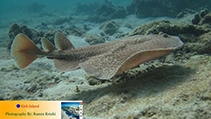| Family: |
Torpedinidae (Electric rays) |
| Max. size: |
130 cm TL (male/unsexed) |
| Environment: |
reef-associated; brackish; marine; depth range 1 - 200 m |
| Distribution: |
Western Indian Ocean: Persian Gulf (Ref. 80050), Red Sea eastward to India (Ref. 2712) and southward to Natal, South Africa (Ref. 5578). |
| Diagnosis: |
Large ray with a small caudal fin and with papillae around the spiracles (Ref. 5578). Bright color pattern of circles and irregular marks, cream or golden on dark red or brown to blackish background dorsally (Ref. 5578). |
| Biology: |
Found inshore in sandy bottoms, and well offshore from the surf zone down to 200 m (Ref. 5578). Also on or near coral reefs (Ref. 12951, Ref. 114953). Common in shallow sandy areas (Ref. 2712). Feeds on bony fishes (Ref. 12951) and benthic invertebrates (Ref. 114953). Ovoviviparous (Ref. 50449). Males mature by 30 cm TL (Ref. 114953). Occurs singly but may form groups during the breeding season (Ref. 12951). Occasionally hooked by anglers, more often seen by divers; can deliver a strong shock (Ref. 2712). Flesh is edible (Ref. 12484). Can survive for hours after being stranded on the beach (Ref. 41394). |
| IUCN Red List Status: |
Data deficient (DD); Date assessed: 07 February 2017 Ref. (130435)
|
| Threat to humans: |
other |
Source and more info: www.fishbase.org. For personal, classroom, and other internal use only. Not for publication.

